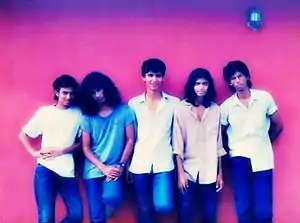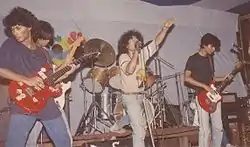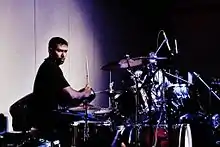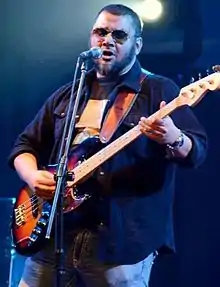Rockstrata
Rockstrata is a Bangladeshi heavy metal band formed in Dhaka in 1985 by guitarist Mainul Islam and bassist Imran Hussain. They were responsible for initiating the metal movement in Bangladesh and inspired many heavy metal artist along with Warfaze. Although their initial career only lasted for seven years and produced only one album Rockstrata (1992). They reunited in 2011 and released their second studio album "নতুন স্বাদের খোঁজে (In the Search of New Taste)" in 2014.
Rockstrata | |
|---|---|
 | |
| Background information | |
| Origin | Dhaka, Bangladesh |
| Genres | |
| Years active | 1985–1992; 2011-2014 |
| Labels |
|
| Associated acts |
|
| Past members |
|
They are one of the pioneering heavy metal band in Bangladesh. The band was active during the live concert scene of Bangladesh between the years of 1985 and 1992.
History
Early years (1984-1986)
Mainul Islam and Imran Hussain were school friends from St. Joseph High School and used to jam together in their high school days. In latter part of 1984 Imran and Mainul decided to perform on their high school graduation rag day show with some additional members who were their friends. They include Asif Alam on vocals, Asif Iqbal on drums, and Shafquat Jan Choudhury on the keyboards. Unfortunately due to insufficient time the band could not perform. However, this initiation resulted in the inception of a phenomenon which took a serious turn that saw, the Imran and Mainul pair on their way to jamming sessions between them.
Beginning of 1985, Asif Iqbal could not continue as the drummer due to family reasons and introduced Mahbubur Rashid as his replacement to the band. In addition, by this time the band decided to pursue heavy metal music and have done away with the keyboard section. At this point the band consisted of Mainul Islam on the guitar, Imran Hussain on the bass, Asif Alam on the vocals, and Mahbubur Rashid on the drums. While studying for their Secondary School Certificate examination Mahbubur Rashid came across the name Rock Strata in the Geography textbook assigned for the exam. The name stuck and was gladly embraced by all the other members of the band; hence Rockstrata was born. The first ever logo of Rockstrata was created by Shahriar Hussain who is a cousin of Imran Hussain. The logo was first drawn on Imran's guitar case. During 1985, while members were enrolled in Notre Dame College the jamming sessions went on, although not on a very regular basis. During this time, one fine morning, while on their breaks in between classes at the college canteen, Mainul was talking to someone about the newly formed band and mentioned "I will only be interested to do a band like Black Sabbath" which was overheard by Arshad Amin who was also having a break at the canteen. Considering that not many people talked about Black Sabbath at the time, Arshad went over to Mainul to further inquire about what's going on and a lifelong relationship begins. Mainul then introduced Arshad to Imran, Mahbub, and Asif later. At the time the band members were increasingly becoming fans of Iron Maiden and planned to mould Rock Strata in the same die, with two guitars. At this point Imran switched from bass to guitars and Arshad joined Rockstrata on the bass. This works out nicely for all since Arshad was a big fan of Pink Floyd and Roger Waters, in particular. This completed the band and the first ever line up of Rockstrata was Asif Alam on vocals, Imran Hussain and Mainul Islam on guitars, Arshad Amin on bass and Mahbubur Rashid on drums.
By the year 1986, the jamming sessions got better and more intense and started to become actual practice sessions. The band practised songs such as Paranoid, N.I.B., and Iron Man by Black Sabbath. It was Imran Hussain who first suggested that Rockstrata should attempt an Iron Maiden song titled 22 Acacia Avenue. While working on this song the band member worked really hard and started on their way to become true heavy metal musicians. When the song was fully worked out, all the members grew in confidence and started to attempt other Iron Maiden songs, such as, Flight of Icarus, Running Free, Aces High, etc. At this point the band felt comfortable enough for a full-fledged show.
First public shows (1986-1990)
In June 1986, there was a social event at the Notre Dame College and the band was approached to play a few songs. However, as soon as the band started to play, the then principal of the Notre Dame College, Joseph S. Peixotto, came running on the stage, looking like he was having a stroke or a heart attack and stopped the show. It was at this time that the band and their friends decided to organise a show with their own financing.
The hunt for a venue was on and after much deliberation the choice was set on the Auditorium at the Engineering Institute, Dhaka. The band members went there to book the show and the venue charge was BDT 20K, which was a lot for the members. Since Mainul's father was an engineer they managed a 50% discount and the venue charge came down to BDT 10K. This money was provided by the band members which came out of their pocket monies and significant contributions from their family members.
The sound system that was used had an output power of 50 watts. Rock Strata goes on stage for the first time with Biru shouting out to a sold-out crowd "Scream for me Engineering Institute!!!", the madness begins, and the virus starts to spread. Only then it was revealed that there was a group of non-conformists in Bangladesh who were metal heads. Rock Strata has staked its claim on the band music of Bangladesh.
In 1987, in a series of unfortunate and bizarre incidents, Biru had to leave for US to pursue higher studies and the band was left without a vocals. It was Arshad who suggested his old school friend from Maple Leaf, Shoaib Rahman who he had met on a chance meeting. Shoaib is invited over for a try out at the Old D.O.H.S. Community Center near Banani, Dhaka, where the band was practising at the time. They immediately clicked and Shoaib joins the band. At the time Rock Strata was covering bands like Black Sabbath, Iron Maiden, Metallica, and Scorpions. Scorpions and Iron Maiden were Shoaib's speciality.
Due to the loud sound that was generated when the band practised and since heavy metal band music was not at all popular in Bangladesh at the time, Rock Strata was in a perpetual struggle to find appropriate practising places and ended up moving from one location to another frequently to practice. Seeing this, Shoaib set up a practice pad at his house by making one of the rooms in his house soundproof and at last Rock Strata had a fixed place for practising. As a consequence of this, intense practice sessions continued with regular shows being performed at various venues and the heavy metal underground scene is created. Along with Rock Strata, several other bands performed in these shows, such as Warfaze, In Dhaka, and Aces. As a result of these shows, a younger generation of metal heads took notice and started to follow these bands and in turn, started forming their own bands and the Metal Movement in Bangladesh was born.
At the time when Rock Strata and its contemporary heavy metal bands were playing heavy metal, other traditional musicians and bands were still sceptic about the musicianship of the members of these bands. The metal music itself was laughed at by others and sneered at as being loud noise instead of music. However, as the metal movement gained momentum and the name Rock Strata was becoming more popular and frequent in the Bangladesh band music scene, the founder of the Bangladesh Musical Bands Association (BAMBA) were becoming progressively more inquisitive about them and other upcoming metal bands. At this time, Rock Strata and their contemporaries Warfaze, In Dhaka, and Aces were the only well-known bands in the heavy metal genre and a scramble was made to include them into the association. The hunt was on – and Mac Haque (Feedback, Maqsood o' Dhaka) who was the President of BAMBA at that time, got hold of the musicians from Rock Strata. After a long, eventful, and sometimes not very congenial debate with other members (many of whom thought that these new kids were uncultured, long-haired, undisciplined loudmouths, not to mention disrespectful) of BAMBA, Mac did succeed in managing to induct them into the association. From then on Rock Strata started performing regularly in most of the BAMBA shows. The initial resentment of the traditional band musicians towards Rock Strata continued to show itself during some of the BAMBA shows. One of the problems that had plagued the band from the beginning is the use of double bass drum kit. At the time only Rock Strata used double bass drums for their songs during concerts. This caused an overwhelming amount of misery to Rock Strata to get a double bass kit on stage, since no other band in Bangladesh had a complete double bass kit. The band had to borrow and put together two different drum kits to make a double bass kit. Often the sound system company would have only one bass drum microphone and/or equaliser, which made the two bass drums sound radically different. Another issue that posed significant problem was the presence of two guitarists and no keyboardists in the band. In all of the multi-band shows Rock Strata had serious difficulty in locating two guitar amplifiers to put on stage. Despite all this problems, the journey of Rock Strata with BAMBA was, although not consistently smooth, but a rather successful one.

In December 1990, Bangladesh was celebrating the downfall of the autocratic Ershad regime and various organisations were celebrating in their own ways. In the same spirit, BAMBA decided to do a day-long concert at the Dhaka University campus. President of BAMBA, Mac Haque called on all members of BAMBA to get ready for the show. However, the pre-requisite was that the show must completely be in Bengali language. This caught the four metal bands completely off-guard since until that time they always covered English heavy metal songs from international bands and did not have original Bengali materials of their own. This apparent obstacle however turned out to be a blessing in disguise for all the heavy metal bands and especially for Rock Strata since this forced them to come up with heavy metal songs using the Bengali language. This had never been done before successfully. Undaunted by the lack of precedents, all the metal bands including Rock Strata decided to write their own first ever Bengali songs of heavy metal genre. It was at this time when the historic heavy metal Bengali songs like Shamanno Dusshopno, Shesh Ratri, Nuclear Shadhintota, Shaadhikar, Ekti Chele, Ei Raate were written and composed and history was in the making.
Rockstrata (1991-1993)
In 1991, Imran Hussain and Mainul Islam decided to pursue higher education in the United States and were making preparations to leave Bangladesh. This rendered the prospects of their returning and continuing Rock Strata a remote possibility. At that time Arshad Amin threw open the discussion to record some songs so that the band can have a memory to brag about and maybe to have a possible future beckoning. At one time during the discussion, the idea of a mixed double album with Warfaze, In Dhaka and Aces, each contributing 4 songs seemed like a good prospect since at the time metal music still had not attained the critical mass. Rock Strata posted the idea to the other bands and they immediately came on board. Filled with enthusiasm, the "Big Four" (not to be confused with the Megadeth, Slayer, Anthrax, and Metallica big four) approached Sargam Production Company with their ideas for recording and releasing the albums. But at that time Sargam was reluctant to release a mixed album of an unknown genre recorded by even more unknown four bands. In an interesting twist of fate, Sargam counter–proposed that if each of the four bands can come up with enough material to record four individual albums, they would be interested to work with them.
Sargam studio agreed to record entire Rock Strata debut album for BDT 30,000 and the writing and composition of the album started. Since Shamanno Dusshopno, Shantir Shopno and Shesh Ratri were already written, Rock Strata had a good starting point for the rest of the album. However, time was of the essence since Imran and Mainul were due to leave for US soon, the band ended up spending sleepless days and nights to get the songs ready for recording. It was at this time that the band decided to switch from Shoaib Rahman to Mushfiq Ahmed as Mushfiq's voice was more appropriate for the songs in the Bengali language. Mushfiq came into the recording with 2/3 of his own songs, both written and composed by him.
While in the studio, Rock Strata faced another problem with the double bass drums. At the time no other band had recorded a double bass drum kit in the studio. However, almost all of the compositions of Rock Strata were based on double bass drumming. The band then rented two different drum kits and put them together in the studio to make a double bass kit. After much toil and sweat Sargam studio managed to record Rock Strata's songs and thereby unknowingly had pioneered the concept of recording double bass acoustic drum kit in the history of the music industry of Bangladesh.
After recording nine songs, Imran had to leave for the US and Mainul had to play both guitars to finish recording of the tenth song of the album. In those days recording were done in spools marketed in cassettes of sixty minutes. After recording ten songs the band found that there were still approximately nine minutes of recording space left for the cassette which should be filled. This gave birth to the eleventh and final Rock Strata song called Kaalo Raat. The song was based on the 1991 Bay of Bengal cyclone that hit and ravaged the coastal areas of Bangladesh. Arshad and Mainul improvised with a few suggestions from Mahbubur Rashid and the song turned out be a little over eight minutes long. Mainul left for the US after completing the guitar tracks.
During the recording of the vocals, Mushfiq's voice unfortunately suffered a severe setback and he had to withdraw after only recording his voice for seven of the songs. Arshad took upon himself and stepped in to sing "Shantir Shopno" and "Nirbashon". In addition, Arshad invited Sunjoy from Warfaze as a guest artist to sing on the tracks "Mukti Dao" and "Kaalo Raat". During the album mastering process, one of the guitar tracks of Kaalo Raat was accidentally deleted and Mainul had already left the country. Other guitarists from the bands in Dhaka, Warfaze and Aces that could be of help were also unavailable. Arshad later enlisted the help of Minhaz Ahmed Piklu (formerly of Jolly Rogers and Aurthohin) and he was gracious enough to play as a guest artist and re-record the deleted guitar track of "Kaalo Raat". In addition, at that time Mashuk Rahman of in Dhaka was visiting Dhaka, Bangladesh from Minnesota, USA on a personal trip. Arshad Amin invited him to play a lead in the track Kaalo Raat. Mashuk kindly obliged and provided the final lead guitar piece, which was composed in a matter of minutes, while they were in the studio, at the end of Kaalo Raat.
Finally after much hardship with cassette productions, the self-titled debut album of Rock Strata was released in 1992 and thus put a stake in the journey of heavy metal scene in Bangladesh. The debut album cover was conceptualised and designed by Abdullah Al Hussain. The cover art will start a new era of album cover design that still goes on today in Bangladesh even though most of today's album covers are done by using the help digital computers. Abdullah's work was completely done by hand.
One of the greatest disasters that the band faced at this point was the idiotic mutilation of the band name which mutated from ROCK STRATA to ROCK STARTA due to the inability to correctly pronounce the real name by some critical personnel. The mutated and incorrect name ROCK STARTA appears on the debut album cover in Bengali font. However, the correct name ROCK STRATA can still be seen etched into the grave headstone that is featured on the cover of the debut album.
Underground years (1993-2010)

From 1993 and onwards, Mainul Islam, Arshad Amin and Mushfiq Ahmed were completely detached from the music scene. Imran Hussain kept on playing with various acts and bands in the US. He worked on and brought out an album with friends from his old heavy metal Dhaka, Bangladesh days, Mashuk & Tushar under the banner of Elephant Road. Mahbubur Rashid went on to play with the Miles from 1993 to 1996. In August 1996, Mahbub also left for the US to pursue higher studies. During this time, Mushfiq recorded an album with another pioneer heavy metal band of Bangladesh, Waves. Waves was founded by Iftekhar Shikder.
In the year 2008/2009 Arshad Amin got involved with the band Stone Free who were a Pink Floyd tribute band. They did a number of outstanding shows in the local club scene in Dhaka, Bangladesh. These shows were highlighted by the use of laser and other special effects, and great sound systems to create the spirit of Pink Floyd. Their performances were incredibly praiseworthy, and as a result, Arshad and Stone Free received excellent and appreciative responses from the audience.
Reformation and "নতুন স্বাদের খোঁজে (In the Search of New Taste)" (2011-2014)
Inspired by the 25 Years of Warfaze reunion concert in 2009, members of Rockstrata started to talk about having a Rock Strata reunion show. However, they were reluctant to do the reunion show based solely on one single album. The band thought that covering songs from bands such as Black Sabbath and Iron Maiden are not a good idea any more. The band therefore decided to record a second album to have enough live show material for a two and a half-hour reunion show. With the thought of comeback still in mind, all the members of the band were pondering on the ways to make it happen. Then, after much discussions going back and forth between the band members, the thought of making the second album was initiated in the middle of the 2011.
One of the questions that the band members must needed to address was to decide on what type of music to put on the album. From the very beginning Rock Strata has always shied away from the mainstream music scene. This is apparent from their selection to play the heavy metal genre in Bangladesh at a time when the metal music was not in widespread acceptance. The members of Rock Strata has always maintained their own musical personalities, have been gladdened by any followers that they got, and was never disappointed by non-acceptance. They simply didn't care for it. The same line of thinking was adopted when working for the new album and band decided to go ahead with old school heavy metal music genre. The band made it a point to include its characteristic heaviness and mind blowing melodies in their compositions. The primary objective was to record songs that will be fun to play live by the band members and remembered by their most die hard fans for a long time. This philosophy was noticeably reflected in the resulting album.

Another challenge that the members had to overcome was physical distance–all members were geographically dispersed over two continents; Mushfiq and Arshad were in Dhaka, Bangladesh, while Imran, Mainul and Mahbub were in the United States. Even with the location constraint, the members started exchanging lyrics and compositions over the internet, using technologies such as, Skype, DropBox, Google+, etc. After months of hard work and preparing demo tracks at the respective members' home studios, recording dates were fixed and studio time was booked at the Winterland Studios in Minneapolis, Minnesota in United States. Arshad flew to Minneapolis, Minnesota in the United States from Dhaka. Mahbub also flew in from Jackson, Mississippi and the recording of their second album started. The drum tracks for all eleven songs of the album were recorded over two days, during 12-hour shifts on each day. In addition, the composition of the song 'Ei Boshontey' was completed while working on the drum tracks in the studio.
The guitar and drum tracks for the second album were recorded in US, the bass and vocal tracks were recorded in Bangladesh with the final mixing and mastering done in USA. Album is produced and published by the G-Series Production Company. Finally, after much deliberation the much awaited album was officially launched during very festive CD launching ceremony on Friday, 7 February 2014 at the same venue where it all started about three decades back – Engineering Institute, Dhaka.
The launching program was conceptualised, designed, overseen, and executed by Arshad Amin and LiveSquare Entertainment. Imran Hussain, Mainul Islam, and Mahbubur Rashid participated and interacted with the event over the internet using the Google+ video conference technology. The event was attended by Ibrahim Kamal Ahmed of Warfaze, Maqsud of Feedback, and Ayyub Bachchu of the band LRB. In addition, several bands performed several of the songs from Rock Strata debut album. The event was the first ever of its kind in Bangladesh. The album has also been made available for electronic purchases and download from iTunes and Amazon websites in MP3 format, so that expatriates who are fans of Rock Strata can have access to the new album. More information on this available at the band's official Facebook page Rockstrata Official
Discography
| Year | Album | Details |
|---|---|---|
| 1992 | Rockstrata |
|
| 2014 | নতুন স্বাদের খোঁজে (In Search of a New Taste) |
|
Members
Final lineup
- Mushfiq Ahmed - lead vocals (1991–1992; 2011-2014)
- Arshad Amin - bass guitar (1985–1992; 2011-2014)
- Mainul Islam - lead guitars (1985–1992; 2011-2014)
- Imran Hussain - lead guitars (1985–1992; 2011-2014)
- Mahbubur Rashid - drums (1985–1992; 2011-2014)
Past members
